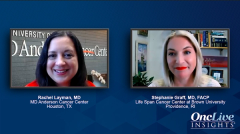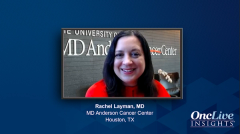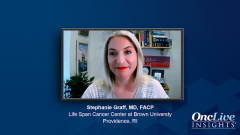
Key Findings from the NATALEE Trial
Stephanie Graff, MD, and Rachel Layman, MD, discuss the design and results of the NATALEE trial, which evaluated adjuvant ribociclib + endocrine therapy versus endocrine therapy alone in patients with HR+/HER2− early breast cancer.
Episodes in this series

Transcript:
Stephanie Graff, MD, FACP: Where monarchE [NCT03155997] included patients with 4 or more positive lymph nodes or patients with 1 to 3 positive lymph nodes and 1 additional risk factor—and I’m not going to list those right now—NATALEE [NCT03701334] included all patients with positive lymph nodes. Even N1, 1 to 3 positive lymph nodes, as well as patients with tumors greater than 2 cm, like T2 tumors, and an additional risk factor. And in NATALEE, that additional risk factor could either be a grade 3 disease or a grade 2 disease with a high genomic risk profile, so MammaPrint/Oncotype, or a grade 2 disease with a Ki-67 of over 20%. That means that some of our patients with T2 lymph node–negative tumors are even eligible for CDK4/6 inhibitors.
We need to wait for the peer-reviewed publication and some additional information to fully understand these different populations. We need to see the data mature to understand the benefits and the subsets. But at this time point, what we’ve seen from the presentation in the ASCO [American Society of Clinical Oncology Annual Meeting] 2023 was that all these populations benefit relatively equally from the addition of ribociclib to adjuvant endocrine therapy. That makes sense with what we know about hormone receptor–positive breast cancer, which is that it is a slowly proliferative disease, and offering antiproliferative therapy over a period…early in the disease course is likely to result in a gradual reduction in the risk of recurrence over time and we’re going to have to wait for the data to mature to see that full story play out. I’m hopeful for the NATALEE data. Of course, it’s early, and again, we’re still going to have to wait to see what regulators do with that.
Transcript edited for clarity.






































